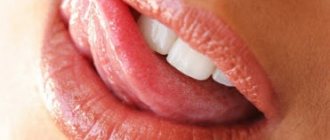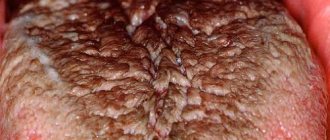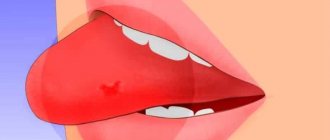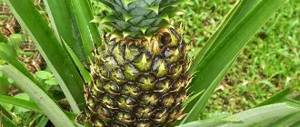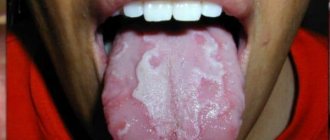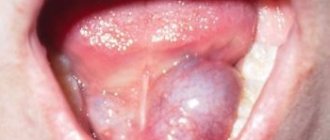What to do if a child bites his tongue hard until it bleeds?
Sometimes mothers have to notice that the child has bitten his tongue until it bleeds, and then the question arises: what to do?
How to help a child relieve pain and stop bleeding? This happens during active games, when eating, and during sports activities. The tongue has a rich network of blood vessels and nerve endings, which is why the bite of this organ is so painful, and the bleeding is severe, sometimes even unstoppable. Every parent needs to know how to cope with such a problem and in what situations it is necessary to consult a doctor.
When a child indicates, or the mother herself notices, that the baby has bitten his tongue until it bleeds, first of all you need to examine the affected area to determine:
- is there bleeding?
- depth of injury;
- area of the bitten area;
- Is this a fresh wound or has it formed previously?
To carefully examine the oral cavity of an older child, bring him to a window, or point a light source into his mouth and ask him to open it wide and stick out his tongue. If you bite hard, it may bleed. A fresh bite will bleed, and swelling and hematoma may occur in place of the old one.
To stop bleeding, the damaged vessels should be clamped, which can be done in different ways.
- Dip a cloth in peroxide and press firmly onto the wounded area.
- Encourage your child to rinse their mouth with cold water.
- Apply an ice cube wrapped in gauze to your tongue for a short time.
If the tip of the tongue is injured, press the gauze swab against the oral surface of the teeth, if the side part is bitten - to the gum, if the back of the tongue is injured - to the palatal surface. The most serious bleeding occurs when the lower part of the tongue, facing the bottom of the mouth, is injured. The folded napkin is placed under the tongue and pressed firmly with your fingers.
If the bleeding cannot be stopped, seek help from the emergency room; the wound may need to be sutured to stop the blood flow.
When a child bites his tongue until it bleeds, and it was stopped, the following tips must be followed to prevent blood flow from restarting and to prevent the wound from becoming infected:
- do not offer your child food or drink for two or three hours;
- hot or sour foods can irritate the wound and resume bleeding, so avoid them for six hours;
- to reduce pain, it is permissible to offer ice cream or let an ice cube dissolve;
- To speed up wound healing and also reduce the likelihood of infection with pathogenic bacteria, let your child rinse his mouth with decoctions of medicinal herbs, including sage, chamomile or St. John's wort.
A dental examination is necessary when the tongue is bitten very strongly, as indicated by some signs:
- The bleeding does not stop for more than half an hour, despite attempts to stop it.
- A through wound of the tongue is observed.
- Part of the tongue has been bitten off, even if only a small one.
- The wounded area was very swollen and bruised.
- The injury does not heal over a long period of time.
Tongue biting often occurs completely accidentally. To prevent possible injury, explain to your child what to do to prevent injury from occurring.
- The child is often so passionate about active play that he keeps his mouth half open, while behaving actively: running, jumping. One awkward movement is enough for the tongue to end up between the teeth and be bitten;
- When playing with the ball, it often hits the head or face. Due to a sharp blow, the jaws move and the tongue can be bitten;
- Falling is the most common childhood problem. During it, the teeth close sharply, and if the tongue is located between them, then it is injured;
- sometimes the baby does not control his behavior, plays around, opens his mouth wide. If he talks while laughing, sometimes his tongue gets stuck between his teeth.
A child bit his tongue until it bled: what to do?
Children often fall; even the most attentive parents cannot avoid such a problem. Unfortunately, the consequences are not always limited to minor scratches and broken knees.
Children often bite their tongue when falling. What to do if a child bites his tongue until it bleeds, how to provide first aid, and when is it necessary to consult a doctor?
If such a nuisance arises, the first thing you need to do is calm down and calm the baby down. Most likely, nothing terrible happened, and the baby is crying from pain and the sight of blood.
The child bit his tongue, it hurts, what to do - first aid rules:
- Stop the bleeding. The tongue has many vessels and nerve endings, so even a minor injury is accompanied by pain and bleeding. Cold will help stop bleeding; encourage your child to rinse his mouth with cold water. To clamp the blood vessels, press a sterile bandage tightly to the wound and hold for 5-10 minutes. Change tampons as needed until bleeding stops completely.
- Disinfect the wound. After rinsing your mouth, treat the wound with an antiseptic. Miramistin is suitable for small children, Chlorhexidine is suitable for older children. You can use a decoction of sage or chamomile for rinsing.
- Eliminate pain. For pain relief, use any gel that is prescribed for difficult teething. Kalgel, Kamistal Baby. If external remedies are not at hand, give Panadol or Nurofen.
- Reduce the load on the tongue. Do not give your child food or water for the first few hours.
What should you not do if your tongue bleeds? Do not apply ice. It is difficult for children to hold the compress motionless, and the effect of extreme cold on the mucous membranes can result in a sore throat or cold. Do not use antibacterial or other potent drugs without a doctor's prescription.
Wounds in the mouth should not be treated with peroxide, iodine, potassium permanganate, brilliant green - all of these agents can cause burns to the mucous membrane. Lidocaine is also not suitable for children; it cannot be swallowed, and this is difficult for children to do.
A sign of wound healing is the appearance of a gray coating on its surface. This is a protective fibrin film.
What to do to speed up healing
In most situations, first aid, when a man or woman has bitten the lower lip and it is swollen, is enough to heal the wound on its own. But if the damage is deep enough or tissue infection occurs, then the use of medications cannot be avoided.
| To remove signs of inflammation and also to speed up wound healing, Metrogil-dent gel is used. The drug is applied to the damaged area after preliminary rinsing with water or a decoction of medicinal herbs 2-3 times a day for 7 to 10 days. Solcoseryl dental paste has a similar effect. |
| To prevent infection, if an ulcer has formed, you can perform a mouth bath with an antiseptic. Miramistin, chlorhexidine or furacillin are best suited for these purposes. It is not advisable to use solutions containing alcohol (iodine, brilliant green) to treat the mucous membrane, as this dries out the tissue and causes irritation of the wound. |
Treatment of wounds with oilsTo ensure faster healing, keratoplasty – drugs that promote tissue regeneration – is successfully used for treatment 2-3 days after injury. Sea buckthorn and rosehip oil, caratoline, as well as a solution of vitamins A and E in oil have this effect. The products are applied directly to the wound with a cotton swab at least twice a day. |
If the listed drugs do not help, then you need to consult a doctor: he will select medications to treat the damaged area.
Women often ask: “If I bit my tongue, an ulcer formed and my lip became swollen, how should I treat it so that it heals faster?” The answer is very simple. If there are no complications, then often the use of medications is not required, because the body itself is able to cope with minor damage. The only thing is that you will have to be more careful about your oral hygiene.
- After each meal you should rinse your mouth with water.
- If an ulcer has formed, then oral baths with decoctions of medicinal herbs will help speed up its healing.
- You will have to exclude from the menu all dishes that irritate the mucous membrane (hot, salty, sour and spicy).
- Brush your teeth twice a day, and also remove plaque from your tongue and treat the interdental spaces.
How to speed up wound healing
After the pain disappears and the bleeding stops, special measures can be taken to help speed up recovery and quickly restore damaged tissue:
- brushing your teeth daily and thoroughly rinsing your mouth after brushing (this will help prevent wound infection);
- daily rinsing of the mouth with infusions and decoctions of medicinal herbs (for example, chamomile);
- Instead of infusions and herbal decoctions, you can take any antiseptic drug (for example, Furacilin).
If even the recommendations you followed did not help get rid of the wound, it increases in size, and the general condition gradually worsens, you must seek the help of a doctor. This is necessary in the following cases:
- if 5 days have passed after biting your tongue and the wound still does not heal;
- if after 2-3 days the wound begins to grow;
- if a blue hematoma has formed at the bite site;
- if swelling has formed at the bite site;
- when causing severe injury: biting through the tongue, biting off the tip, etc.
We suggest you read: How to treat stomatitis in children: causes and characteristics of the disease
Possible complications
Wounded areas of the cheeks or tongue can become a prerequisite for the development of an infectious process on the mucous membrane, therefore, when an ulcer or extensive wound forms, a mandatory dental examination is required, followed by treatment of damaged areas of soft tissue.
If you do not seek medical help in a timely manner, the following complications may develop:
| This is a disease of the oral cavity that tends to have cyclical exacerbations. Small ulcerations appear on the mucous membrane, which are very painful. They are also called aphthae; |
| The main cause of its occurrence is the herpes simplex virus. By the way, it is present in the blood of 99% of the population. Many factors, including biting your cheek and decreased immunity, lead to this disease occurring. Small bubbles with clear liquid, grouped into 10–20 elements, form on the affected area. After opening them, the ulcerated surface is covered with a weeping crust; |
| This is the most common consequence if an adult or child bites their cheek. It is characterized by pain of moderate intensity and redness of the damaged area. With adequate treatment and the absence of regular injury, it quickly resolves; |
| This is a disease that occurs after a person begins to frequently bite his cheek or lip. Children who have special bacteria living in their mouths are more susceptible to pathology if the child does not brush their teeth well. The lesion on the mucous membrane is covered with a grayish-yellow coating; |
Ulcer malignancyThis is the most terrible consequence that can occur in those who often bite the mucous membrane. In other words, due to regular damage, the structure of tissues is restructured and their uncontrolled growth begins, which leads to cancer. |
It is impossible to diagnose diseases on your own, so if you have the slightest suspicion of the development of complications, you should consult a dentist or therapist for advice.
A child bit his tongue - how to treat it
The mucous membrane quickly recovers, so minor injuries to the tongue do not require special treatment, but you cannot do without medication at all. A few simple rules will help speed up the wound healing process.
What do we have to do:
- Adjust your diet. Eliminate hot and cold foods from the menu. All food should have a soft or liquid consistency. Products that contain vitamin B and C will help speed up the process of mucosal restoration.
- Maintain good oral hygiene. Teach your child to rinse his mouth after every meal, using pharmaceutical or natural antiseptics for this. Brush your teeth and gums twice a day; you do not need to brush your tongue until it heals.
- Strengthen your immune system. Vitamin complexes, rosehip decoction, honey - all these remedies will help avoid the addition of secondary infectious pathologies.
- Solcoseryl paste. A good medicine with an anti-inflammatory effect, accelerates the process of mucosal regeneration, and prevents the development of secondary infections. Apply to the damaged area 3-5 times a day until complete healing.
- Gel Metrogyl. Contains metronidazole and chlorhexidine, quickly eliminates microbes and manifestations of the inflammatory process. Apply three times a day for a week.
Despite the ban on eating cold foods, you can give your child ice cream. This will reduce the pain a little and lift your mood.
These rules must be followed for 1-2 weeks after the injury.
Folk remedies
Alternative medicine methods are safe, have analgesic, antimicrobial and anti-inflammatory effects.
What you can use:
- Aloe juice. It tastes bitter, but promotes rapid healing of ulcers and prevents the appearance of pus. To improve the taste, you can mix it in equal parts with honey and apply it to the injured area 4-5 times a day.
- Salt. Dissolve 1 tsp in 200 ml. regular or iodized salt, use a rinse solution. This product has a pronounced antibacterial and drying effect. It is enough to use it twice a day.
- Soda. Mix a small amount of baking soda with water to make a paste. Apply to the wound 2-3 times a day to eliminate pain and swelling.
- Herbs. Calendula, chamomile and sage are natural antibiotics. Prepare an infusion of 250 ml boiling water and 2 tsp. raw materials, cool to a comfortable temperature. Use as a mouth rinse 4-5 times a day.
For minor tongue injuries, folk methods can be used as independent means of therapy.
Causes of tongue injury
A similar problem constantly arises in children. Increased activity, games in motion, lack of concentration while eating are the main reasons why a child injures his tongue with his teeth. Damage can occur from above, side or below. Even a slight bite of the tongue leads to sharp, severe pain, which gradually fades away. Later, an ulcer appears at this place, which heals on its own.
It’s worse when the child bites his tongue deeply, that is, until blood appears. In this case, the wound continues to be very painful, bleeds, causes discomfort when eating, and interferes with normal conversation.
Bleeding on the tongue must be stopped
With adults it is both easier and more difficult. On the one hand, a mechanical injury to the tongue is tolerated much more calmly, and an adult will not shirk medical procedures. On the other hand, many simply leave the damage unattended, which sometimes leads to the appearance of pustules and the development of tongue diseases.
People often wonder why I bite my tongue or why it's happening more often. Typically, tongue biting occurs while eating, while talking, or even while sleeping. But to answer this question, you need to understand the principle of the very mechanism of operation of the above-mentioned muscle.
Premotor and motor neurons in the human brain are responsible for the movements of the tongue, jaws and cheeks. Accordingly, if the coordination of the muscles of the face or mouth is impaired, this indicates a malfunction of some nerve cells in the brain or a violation of impulse transmission.
The reasons for this are mental fatigue, stress, recent shocks, and hidden neuromuscular diseases. Damage can also appear as a result of diseases of the tongue: loosening of the muscle, increasing its size.
Sports injury to the tongue is a common occurrence.
Treatment consists of eliminating the root cause. If there is nervous exhaustion or stress, you need to take care of your own rest and take sedatives. If the problem is deeper and is the result of diseases occurring in the body, the underlying ailment must be treated.
Cut on the side of the tongue - biting while eating
Why are you biting your tongue? Sometimes this happens by accident and does not have any serious reasons other than carelessness or absent-mindedness. In this case, you just need to watch yourself and your actions
How to tell if your child is biting his tongue
If a child complains that his tongue hurts or you yourself have seen that it can be bitten, you should definitely take a closer look at the wound.
It is advisable to bring the baby to daylight and ask him to stretch out his tongue as much as possible. A fresh wound will bleed, and an older one will swell, often causing a hematoma. You should also check your tongue if your child complains of pain from hot or spicy food. This most often indicates damage of this nature.
What means are used?
Tongue bite is a common injury. Liquid products are used. Rinsing relieves inflammation, pain, and accelerates wound healing. The following tools can be used:
- Hydrogen peroxide. This is an excellent antiseptic with a mild effect. It will inhibit the development of bacteria, clean the wound, and speed up healing. A hydrogen peroxide solution is used for rinsing. 3% peroxide is diluted in water. Proportion 1:1. The number of rinses is twice a day, not more often. The solution should not be swallowed, so it is better not to use it if the child is injured. You can apply a tampon soaked in peroxide to the area of inflammation.
- Salt solution. Salt perfectly disinfects and promotes wound healing. You need to prepare a low concentration saline solution. Just add a teaspoon of salt to a glass of water. To prevent the salt from settling, it must be stirred well. You need to rinse your mouth with this solution three times a day.
- Antihistamines and antacids. They work in the same way as salt or peroxide. Additionally, if used together, acidity in the mouth can be controlled. Antacids include Gaviscon or Gelusil. Antihistamines – Diphenhydramine. It is necessary to use drugs from both groups simultaneously, in equal proportions. You can also make compresses with them. It is also possible to use them separately.
- Rinse aids. Mouthwashes contain substances for healing wounds in the mouth. Therefore, they can also be used in case of injury. The instructions will tell you how to rinse. They can be used every time after eating. Hydrogen peroxide can be used to treat the wound.
What to do if you bite your tongue until it bleeds, do you need to treat it with hydrogen peroxide? We all know that any damage to the skin or mucous membranes is an entry point for a variety of infections.
It is necessary to treat all open wounds and wounds without exception. It is necessary to use special mild antiseptics in the oral cavity. Before using them, it is recommended to gently brush your teeth and rinse your mouth thoroughly.
Oral antiseptics are available today in various forms. These are rinses, sprays and lozenges. The most popular among them: “Furacilin”, “Antiangin”, “Miramistin”, “Trachisan”.
Folk remedies
After you have bitten your tongue, you can begin therapy with folk remedies, from which medicinal decoctions and infusions are prepared:
- salt: 1 tbsp. l. water for 1 tsp. salt, stir and rinse after meals;
- hydrogen peroxide: dissolve soda in water in equal volumes, rinse the mouth with the prepared product after eating;
- milk of magnesia and Benadryl: mix the ingredients in equal parts, rinse the mouth with the prepared product after eating.
You can get rid of a wound with the help of honey, which has an antiseptic effect and helps coat the mucous membrane, thereby preventing its irritation and the proliferation of pathogenic microorganisms. Another natural antiseptic is turmeric in powder form. You can add a pinch of turmeric to honey and apply the mixture on the wound.
We suggest you read: How to replace a mouthguard for teeth
Tongue bite is a common injury. Liquid products are used. Rinsing relieves inflammation, pain, and accelerates wound healing. The following tools can be used:
- Hydrogen peroxide. This is an excellent antiseptic with a mild effect. It will inhibit the development of bacteria, clean the wound, and speed up healing. A hydrogen peroxide solution is used for rinsing. 3% peroxide is diluted in water. Proportion 1:1. The number of rinses is twice a day, not more often. The solution should not be swallowed, so it is better not to use it if the child is injured. You can apply a tampon soaked in peroxide to the area of inflammation.
- Salt solution. Salt perfectly disinfects and promotes wound healing. You need to prepare a low concentration saline solution. Just add a teaspoon of salt to a glass of water. To prevent the salt from settling, it must be stirred well. You need to rinse your mouth with this solution three times a day.
- Antihistamines and antacids. They work in the same way as salt or peroxide. Additionally, if used together, acidity in the mouth can be controlled. Antacids include Gaviscon or Gelusil. Antihistamines – Diphenhydramine. It is necessary to use drugs from both groups simultaneously, in equal proportions. You can also make compresses with them. It is also possible to use them separately.
- Rinse aids. Mouthwashes contain substances for healing wounds in the mouth. Therefore, they can also be used in case of injury. The instructions will tell you how to rinse. They can be used every time after meals.
Hydrogen peroxide can be used to treat the wound.
Rinse recipes
To clean the wound and prevent infection, you should use a mouth rinse. This procedure will be carried out especially if the tongue was bitten while eating. After rinsing your mouth, you need to spit; if there is blood, rinse your mouth several times. Below are the most popular remedies that you can prepare at home:
Saline solution. You will need a glass of water, you can use tap water, but preferably warm. Pour a spoonful of salt into it and stir the mixture. It is recommended to rinse your mouth with this solution for about fifteen seconds and then spit it out. You should rinse at least three times until the wound heals. This procedure is especially effective if used immediately after meals. Salt has the quality of killing harmful bacteria in the mouth. In addition, thanks to this procedure, the wound is cleaned well and the risk of infection is reduced.
Hydrogen peroxide. To prepare this rinse, you need to mix three percent hydrogen peroxide and water in equal parts. With the same duration as in the previous recipe, rinse and spit
When performing the procedure, be careful not to swallow the solution. You can rinse with hydrogen peroxide three to four times a day.
It is considered an excellent antiseptic and copes well with the growth of bacteria in the mouth. In addition, peroxide will perfectly clean the wound, remove dirt from it, and also ensure the delivery of the required amount of oxygen to the cells, which, in turn, will help stop bleeding. This rinse can also be in the form of a gel, very convenient for lubricating the wound, all you need is a cotton swab and a swab.
Antacid. To prepare the mixture, you will need to take equal proportions of Benadryl - an antiallergic liquid and an antacid, for example milk of magnesia, and mix everything. Rinse for a minute and then spit. Can be performed up to two times. Antacids help lower acid levels in the mouth, which improves healing. Antihistamines will reduce inflammation. The mixture of these products creates a unique and effective rinse. You can prepare the mixture in the form of a paste; this is mainly convenient for those who cannot rinse their mouth for one reason or another and apply it to the wound.
Regular rinses. To perform the procedure, you need to take the dose that is usually recommended and rinse for at least half a minute. It is necessary to use rinses after eating. This will help cleanse the wound of food debris, protect against infection and speed up the healing process. You can also use products such as benzydamine hydrochloride for rinsing. The main thing is that everything is carried out strictly according to indications.
What are the consequences of “self-eating”?
If a “self-bite” happens occasionally, and after that the person follows all the rules of hygiene and oral care, the wound in most cases heals successfully. But sometimes, due to a careless attitude towards oneself or due to some other factors, secondary conditions develop - dangerous to health and life.
"Language Wars"
The best thing that can happen with a tongue injury is long-term pain.
This fleshy organ takes a long and painful time to heal, especially if the person has bitten his tongue very hard and the wound is deep.
Other consequences of bite are associated with infection and represent a chain of conditions arising from each other:
- Glossitis. A tongue subject to inflammation changes its color and structure. There is discomfort, a slight burning sensation, and the person may lose the sense of taste.
- Abscess. The tongue begins to swell from the inside, and the person cannot eat or speak normally due to pain.
- Phlegmon. The inflammation reaches the point that the patient is no longer able to swallow or even breathe normally. Such a person is indicated for urgent hospitalization.
Damage to the buccal mucosa
Soft tissues heal quickly, but at the same time a pathogenic agent may have time to get into the wound. Typically, injuries to the buccal mucosa accompanied by infection lead to the following complications:
- Aphthous stomatitis. The disease is prone to relapse. It is a collection of small ulcers on areas of the oral mucosa that cause unbearable pain to a person.
- Herpetic stomatitis. Herpes lives in the bloodstream of 99% of people, so with low immunity there is a high risk that this virus will “wake up” and colonize the wound. With such a lesion, crowded small bubbles with liquid inside settle on the mucous membrane around the injured area.
- Afta Bednar. The disease mainly affects children. A special type of bacteria begins to multiply in the wound due to poor oral hygiene. The mucous membrane becomes covered with a yellowish coating.
Teeth on lips...
There is a lot of loose fiber in the lips and a strong bite can not only cause a wound, but cut off part of it. After biting your lip, the following complications may occur:
- Hematoma. Internal bleeding after biting can be quite severe. The lip swells, becomes painful, and its functions are partially impaired. A hematoma can have a complication in the form of purulent inflammation, which is very dangerous. The temperature rises to 40 degrees.
- Inflammation. When an infection gets into the wound, the lip swells and fills with purulent exudate. The patient feels an unpleasant odor emanating from the site of injury. The condition requires urgent treatment.
Help at home
If a child’s tongue injury does occur, what should be done in such cases? There is an urgent need to stop the bleeding. The child should rinse his mouth with cold water; you can apply a piece of clean ice to the wound surface. As a rule, these simple manipulations quickly stop the bleeding.
Now you need to numb the affected organ. If you have a special antiseptic spray or gel, they will quickly and reliably help relieve pain if the child bites his tongue hard. When the analgesic effect wears off, you will most likely have to use analgesics in tablets or syrup to completely calm the pain. In this case, ordinary paracetamol is a real help at home.
How to treat and relieve pain in a baby’s tongue? After you have taken measures against pain, it is imperative to carry out an antiseptic treatment of the surface of the baby’s tongue
This is very important to prevent purulent complications from developing. For this you can use well-known proven medicines - brilliant green or blizzard blue
You should not use medications such as streptocide or miramistin ointment; most likely your baby will simply swallow them. In the future, it is worth regularly repeating the application of disinfectants to the tongue.
Methylene blue
Maintain proper oral hygiene. Don’t forget to brush your child’s teeth morning and evening; use a decoction of chamomile, nettle, and calendula for rinsing.
First aid
If the question arises about what can be done if you bite your tongue, then most likely there is significant damage and severe pain.
A small wound heals in a fairly short time and does not bother the person in any way. Deep injuries are accompanied by pain and bleeding. Tongue biting in children requires urgent medical attention to prevent dangerous consequences. You should not ignore the pain and hope that it will disappear on its own. Due to the child’s undeveloped immunity, an infection can easily penetrate into the damaged tissue and spread further throughout the body through the bloodstream. The doctor will be able to properly treat the wound and prescribe further treatment.
If for one reason or another it is impossible to visit a doctor, you can provide first aid at home. In most cases, at this stage, therapy ends, and further visits to a specialist are no longer required.
If bleeding occurs after biting your tongue hard, you should try to stop it. To do this, use pressure: press the tongue against the palate or gum.
Important! You can reduce the intensity of the inflammatory process and stop the flow of blood using a cold compress. An ice cube from the freezer works great.
To calm the child and reduce the intensity of pain, you can use a lidocaine solution, in which a cotton swab is moistened and applied to the injured area. There is no need to apply too much lidocaine. Otherwise, irritation will occur. In addition, it is necessary to ensure that the child does not accidentally swallow saliva with the drug until it is absorbed into the tissue.
In some cases, stitches are required, which only a specialist can do. Self-medication is not recommended.
How to treat?
During treatment, you should continue to use cold compresses. Prepare ice cubes in a plastic bag and freeze your tongue until the pain subsides. To make it more comfortable, you can wrap the bag with a damp, thin cloth. Try not to consume any acidic foods during this period. You can suck on fruit-based ice cream and drink cold drinks. In this way, it will be possible to stop the bleeding, even if it appears again, and also reduce pain during treatment. There are also other recipes for quick wound healing:
aloe vera. This gel can be purchased at any pharmacy chain. Or use a living plant, for example, by cutting a leaf and collecting the pulp from it. Then use it as a compress, applying the pulp to the wound at least three times a day. It is advisable if this procedure is performed after rinsing the mouth and before going to bed. Aloe vera is a natural herbal remedy that can improve blood circulation. In addition, it has bactericidal properties and can suppress certain types of harmful bacteria.
When using, be careful to prevent ingestion. This product can also be used in this way: take a small piece of bandage and put the gel on it, then apply it to the wound
Saliva will not dissolve it and this will extend the period of action of the gel.
oral gel. It can also be purchased at any nearest pharmacy; it will effectively anesthetize and disinfect the wound. For example, Orajel, which comes in the form of a tube, is popular and convenient in this particular case. To carry out the procedure, just squeeze out a little gel and place it on a sterile cotton swab, then apply to the affected area. It is recommended to repeat the procedure two to four times until the wound begins to heal.
adhesive paste. You can use this dental remedy. The effect of use is similar to oral gel. Place a little paste on a sterile cotton swab and then lubricate the wound. Repeat frequency up to four times a day. You don't have to bother putting the gel on the stick, just apply it with your finger. First wash your hands well with soap.
baking soda. To prepare the product, you need to dilute a teaspoon of this product until you get a homogeneous paste. You should dip a stick with cotton wool wrapped in this paste and lubricate the affected area. Baking soda helps reduce acidity in the mouth and suppress bacteria, and also reduces swelling and pain when the inflammatory process begins.
honey. This procedure is not only simple, but also pleasant. You need to take a teaspoon of the product and lick it, you can just drop some honey on the bite area. The frequency of the procedure is up to twice a day. Honey is an excellent remedy that has an enveloping effect. It will protect the mucous membrane, preventing the proliferation of harmful bacteria. It will only be beneficial if you add turmeric to honey, a pinch is enough. Turmeric is also an excellent antibacterial agent and will help suppress some harmful bacteria, which, when combined with honey, ensures that the wound heals faster.
milk of magnesia This treatment method will especially bring a noticeable effect if used after the procedure of rinsing the mouth. Milk is an excellent active antacid. Using this method, the patient will be able to achieve not only the suppression of harmful bacteria, but also create a favorable environment for beneficial microorganisms. To carry out the procedure, soak a cotton swab in milk of magnesia and apply three to four times a day to the wound.
“My child was bitten by a child!”
It all started when I read a mother’s post in one popular parenting community: “In kindergarten, my child was bitten by another child, what should I do, dear accomplices?” “ "inadequate" child. One of the group members jokingly summed it up: “The child goes to an orphanage, the parents go to prison.”
After that, at night I had a dream: I stood at some award ceremony in a luxurious dress with a statuette in my hands. Someone handed me a glass of champagne, and I began to make a heartfelt speech. It wasn't even written down on paper! It's easy to say when the words come from the heart:
"Women! Mothers! I raise this glass to you. For your health. Because if your child bites, it's almost certainly seriously damaged. We are threatened and persecuted. We are being insulted! We are being humiliated! But we will endure. We will endure because..."
I didn't have time to find out why. The alarm clock rang. It was time to get ready for the garden. My daughter went to a small private kindergarten for a month, and I remember the episodes with bites very well. The boy took the spatula from her, she took the spatula from him, and then someone bit someone, and a fight ensued, which the children themselves forgot about a minute later. There was a case when a daughter bit a new girl just like that. With delight. She had beautiful long hair, like a little mermaid. Pink shoes, wonderful bow! It would be so great to make friends with this girl... But how to make an acquaintance? Oh yes, I remember there was one way to attract everyone’s attention that worked great!
Sooner or later, children who bite, of course, understand that piercing the hand of a peer with their teeth is not the strongest basis for eternal friendship. Usually in this short period “the child grows teeth - the child understands what to do with them,” the mother manages to turn gray and match the hair color of Daenerys Targaryen, the heroine of the fantasy series “Game of Thrones,” the mistress of three huge dragons. Until her “children” learned to behave civilly and not leave scorched fields and villages behind them, she developed quite a neurosis and almost lost her life several times!
But no one even yelled at her: “I’ll sue you!” I'll write to guardianship! To the President! To the Hague court and even to the last resort - parent chat! Let everyone know that your child bit mine.”
My child bit and was bitten, took a shovel and gave it back, shared a slide, shared a swing, threw sand in someone else’s child’s eyes and received sand from someone else’s child in the eyes. Three hundred times I managed to stop the crime, but I didn’t have time for the three hundred and first, and then something began that probably would have been permissible only if I had actually told the child, “Look, another kid is coming!” fas!
We all really want to protect our children and stop aggression. Look what! Bite another person. It is unlikely that anyone over five years old doubts that you should not bite anyone, even if you really want to. And if your child is bitten by another child, a way to yell “monster! I hate it! now my husband will come and punch everyone in the eye!”, probably seems very good... But there is one small problem - he doesn’t help. Just as shouting “be quiet, I told you” and admonishing “don’t be insolent to me, you little bastard” doesn’t help.
Only once, the mother of the boy who was bitten by my daughter called out to me even before I had time to choose where it would be more convenient to fall on my knees and apologize. "Excuse me, please! - I started. “Veronica, immediately ask the boy for forgiveness...” The mother of the offended boy smiled. From happiness and gratitude I would even like to say that flowers bloomed around her and birds began to sing. At least that's what it seemed to me then. “Well, nothing,” she said. - Guys, make up! Do you want me to show you soap bubbles? Not even five minutes had passed before they started jumping happily next to each other, and we exchanged phone numbers so we could go for a walk together, and went home...
Comments on the post “What should I do? my child was bitten by a child!” usually full of threats.
"Tear it apart!"
“Exterminate!”
“Yes, I would already be standing right next to the sandbox with the prosecutor!”
If only the problem of children's quarrels and biting could really be solved this way. We, mothers of children who bite, might then simply take self-defense courses and get a bodyguard. You could even have gladiatorial fights between your husbands. Mine, for example, is a pretty strong guy. After all, our children are also bitten, and we are people too. I so want at these moments, choked with indignation and tears, to shout: “How dare you? My baby! My angel! Police, come here immediately."
I'm raising this imaginary glass of champagne to you girls! For those who restrained themselves at such a dramatic moment and, forcing out a smile, said: “Guys, don’t quarrel. We accept the apology. Here are soap bubbles, here is a spatula for each. Here is a world in which no one eats each other. Biting is not good."
When to see a doctor
Parents can usually eliminate the negative consequences of tongue biting themselves. But in some cases you cannot do without medical help.
Dangerous symptoms:
- the wound bleeds heavily, bleeding continues for more than 15 minutes;
- the damaged area has swollen, an extensive hematoma has formed;
- the size of the wound on the tongue is more than 5 mm, it is quite deep, or has uneven edges;
- pus appeared at the site of injury;
- the child bit through his tongue or bit off the tip;
- painkillers do not help;
- the tongue is swollen, there are seals on the surface;
- blue lips, convulsions are signs of painful shock;
- deterioration of general condition – fever, weakness;
- the wound does not heal for more than 4 days.
In such situations, the doctor will tell you how to treat the tongue. You may need to consult a traumatologist, dentist, or maxillofacial surgeon.
Pathogenic microorganisms enter the wound, which is fraught with the development of bacterial and viral pathologies.
